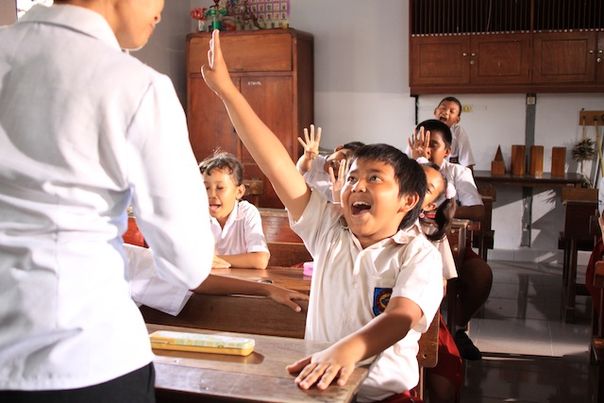BIG IN A SMALL WAY
By celebrating the everyday over the epic, STEPPING ON FLYING GRASS becomes an epic in its own right.

STEPPING ON FLYING GRASS
The Berlinale Generation film STEPPING ON FLYING GRASS (CITA-CITAKU SETINGGI TANAH, Indonesia) revolves around Agus, a boy in Muntilan, Central Java. When his teacher asks the students to write an essay about their dream, Agus proudly says that he wants to dine in a Padang restaurant, renowned for serving a banquet-like dinner. His reason is simple: he is bored of eating the “tahu bacem“ (deep-fried spiced bean curd) made daily by his mother. This prompts laughter from his classmates, jeering Agus for having little ambition; their dreams include becoming a soldier and a big-time actress. Our protagonist stands tall. He carves himself a bamboo piggy bank and seizes the opportunity to earn some cash as a courier. He wants to prove that his dream is worth pursuing.
Narratively, very little happens in Eugene Panji’s debut feature. The conflict is way too thin to be stretched over an 80-minute film. The plot is also too contrived: help conveniently appears every time the protagonist runs into a problem. Yet the film’s simplicity is its strong suit. Children’s films don’t always portray childhood from a child’s perspective. In Indonesia, that’s certainly the case. Most children’s films in Indonesia mirror RAINBOW TROOPS (LASKAR PELANGI) and THE DREAMER (SANG PEMIMPI), two of the nation’s highest-grossing films. Both are coming-of-age dramas heavy with references to the country’s politics and development. Both create a child’s world from an adult perspective.
STEPPING ON FLYING GRASS takes a different route. Like its protagonist, the film is big in a small way. The filmmaker limits the parents to a very few appearances, as if the world had been taken over by kids. Their concerns are believably childlike: after collecting lots of coins from his part-time job, Agus is too excited to be separated from his piggy bank. He brings it to the bedroom, to the bathroom, everywhere.
Social context creeps into STEPPING ON FLYING GRASS. Muntilan is a small town with a severe lack of development, reflected by the rundown buildings shown in the film. There are also a few references to Agus’s father, who struggles to raise his family. But Panji tones down these social elements in favour of creating an idyllic background for the story. The film is riddled with wide shots, framing the kids between the landscapes they continually pass on their way to school: rivers, rice paddies, lush green forests, and Mount Merapi. When the story aims to be so simple, who needs a heavy-handed treatment? By celebrating the everyday over the epic, STEPPING ON FLYING GRASS becomes an epic in its own right.

